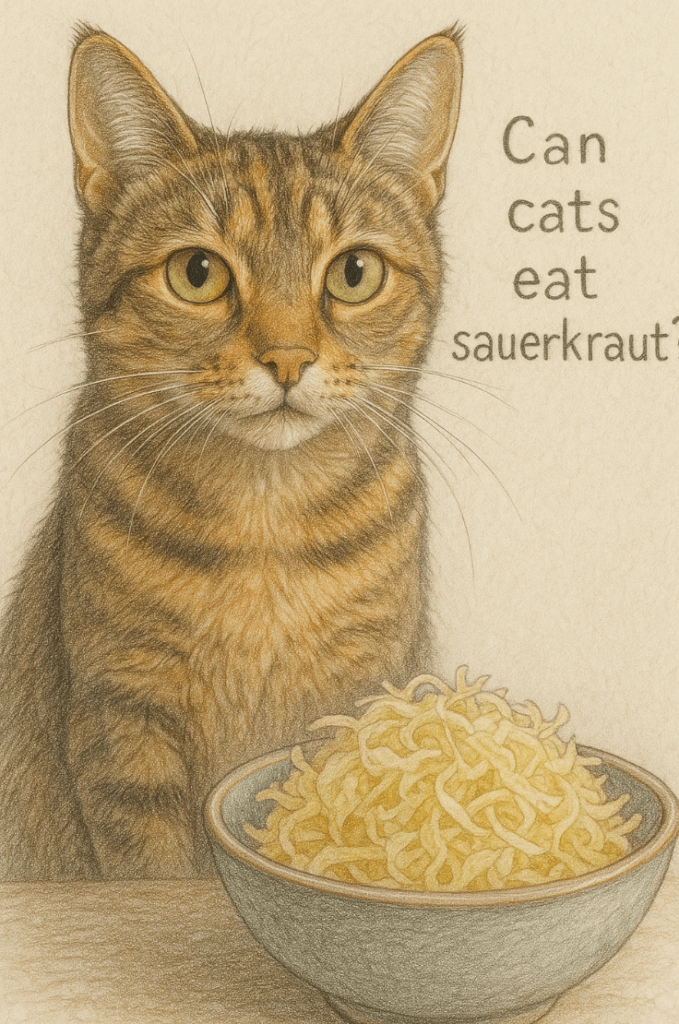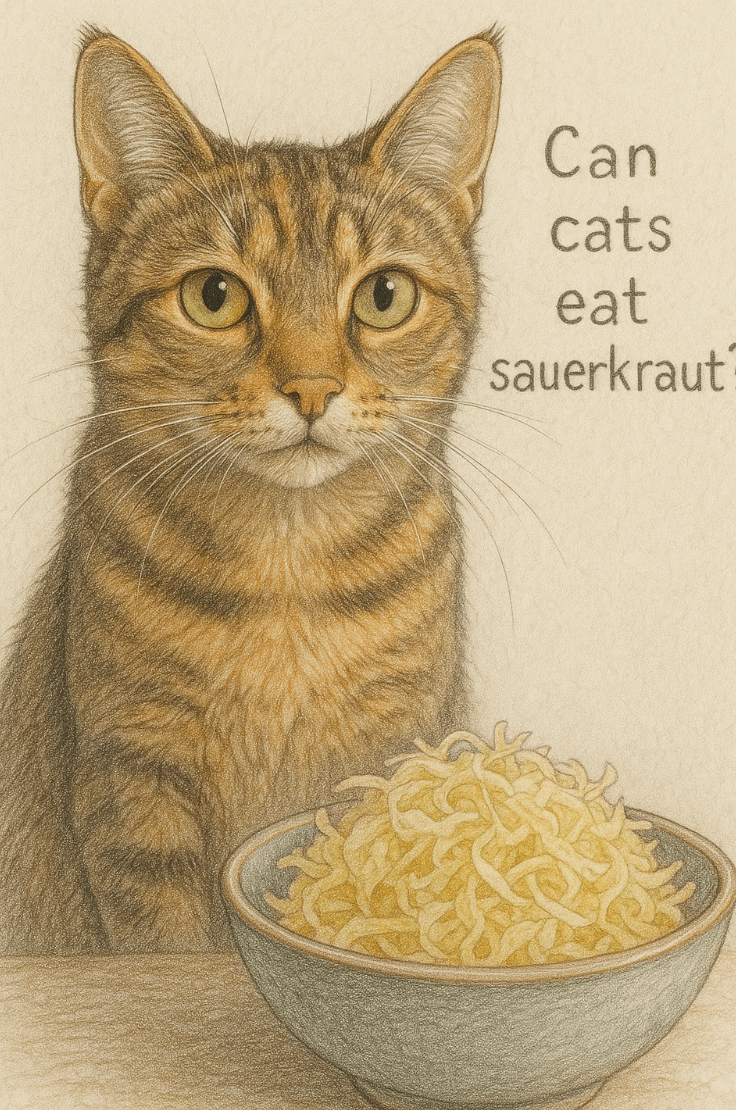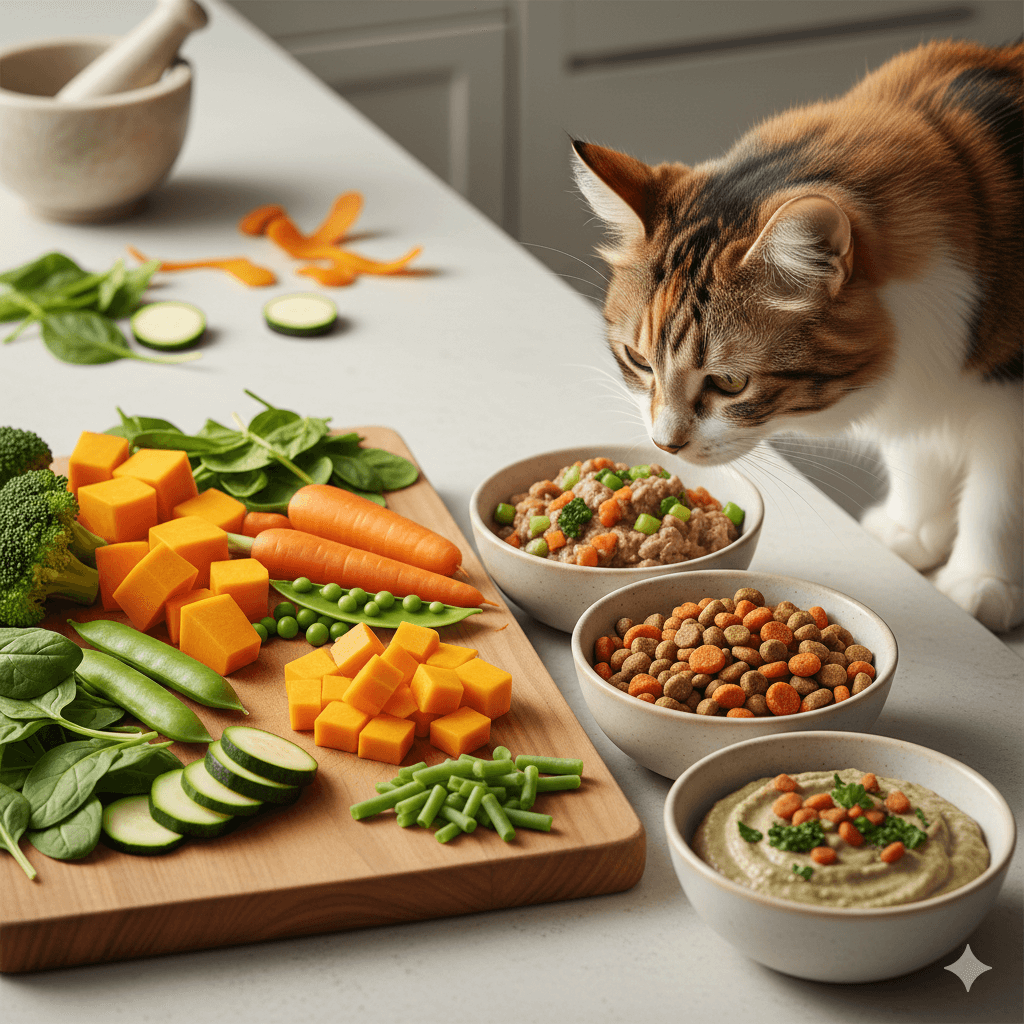Can Cats Eat Sauerkraut?
When it comes to feeding your feline friend, it’s natural to wonder which human foods are safe and beneficial for them. Sauerkraut, a fermented cabbage dish known for its probiotic properties, often sparks curiosity among cat owners. While this tangy food is a staple in many households, its suitability for cats requires careful consideration. Cats have unique dietary needs as obligate carnivores, meaning their bodies are designed to thrive on animal-based proteins.
However, some plant-based foods can offer limited benefits when introduced cautiously. In this blog post, we’ll explore whether sauerkraut is safe for cats, its potential advantages, and important precautions to keep in mind.
Potential Benefits of Sauerkraut for Cats
While cats don’t require plant-based foods to meet their nutritional needs, small amounts of sauerkraut may provide some health benefits due to its probiotic content. Here’s what you need to know about the potential advantages of sauerkraut for your feline companion.
Probiotic Support:
The live cultures in sauerkraut can promote gut health by balancing the bacteria in your cat’s digestive system.Improved Digestion:
Probiotics may help alleviate occasional digestive issues like constipation or diarrhea when used sparingly.Rich in Vitamins:
Sauerkraut contains vitamins like vitamin C and K, which can support your cat’s immune system and overall health.Low-Calorie Option:
Sauerkraut is low in calories, making it a safe treat option if given in tiny amounts without added sugars or seasonings.Natural Fermentation Process:
The fermentation process enhances nutrient availability, potentially benefiting your cat’s gut flora.
While these benefits exist, it’s crucial to remember that sauerkraut should only be an occasional addition to your cat’s diet, not a regular staple.
Risks of Feeding Sauerkraut to Cats
Despite its potential benefits, sauerkraut poses certain risks that every cat owner should be aware of before offering it to their pet. These hazards highlight the importance of moderation and careful preparation.
High Sodium Content:
Sauerkraut is naturally high in salt, which can lead to dehydration or sodium toxicity in cats if consumed excessively.Digestive Upset:
Some cats may experience gas, bloating, or diarrhea after consuming sauerkraut due to its strong flavor and fermentation.Allergic Reactions:
Although rare, some cats may have sensitivities or allergies to fermented foods, leading to itching, swelling, or vomiting.Added Ingredients:
Store-bought sauerkraut often contains spices, garlic, or onions, which are toxic to cats and must be avoided entirely.Not Species-Appropriate:
As obligate carnivores, cats derive little nutritional value from plant-based foods, making sauerkraut unnecessary for their diet.
Understanding these risks ensures you make informed decisions about incorporating sauerkraut into your cat’s meals safely.
Check this guide 👉Can Cats Eat Matcha? Best 7 Expert Tips!
Check this guide 👉Can Cats Eat Birds? Best 7 Expert Tips!
Check this guide 👉Can Cats Eat Artichokes? Best 7 Expert Tips!

Safe Practices for Feeding Sauerkraut | Risks to Avoid When Feeding Sauerkraut |
|---|---|
Offer plain, unseasoned sauerkraut | Avoid sauerkraut with added spices or garlic |
Serve in very small amounts (1/2 teaspoon) | Prevent overfeeding to avoid sodium overload |
Introduce gradually to monitor tolerance | Never give sauerkraut daily or as a meal replacement |
Choose organic or homemade varieties | Skip sauerkraut if your cat has digestive issues |
Consult your vet before introducing new foods | Watch for signs of allergic reactions or discomfort |
How to Safely Introduce Sauerkraut to Your Cat
If you decide to try sauerkraut with your cat, it’s essential to introduce it carefully to avoid adverse reactions. Follow these guidelines to ensure a smooth and safe experience.
Start with Tiny Portions:
Begin by offering just a small taste, such as 1/4 teaspoon, to see how your cat reacts.Choose Plain Varieties Only:
Opt for plain, unsalted sauerkraut without any added ingredients like garlic, onion, or sugar.Monitor for Adverse Reactions:
Observe your cat for signs of digestive upset, such as vomiting, diarrhea, or lethargy, after consumption.Limit Frequency:
Sauerkraut should only be given occasionally, no more than once a week, if at all.Mix with Familiar Food:
Blend a tiny amount of sauerkraut with your cat’s regular wet or dry food to mask the strong flavor.
By following these steps, you can minimize risks while exploring whether sauerkraut suits your cat’s palate and digestion.
Signs Your Cat May Not Tolerate Sauerkraut
Even with careful introduction, some cats may not tolerate sauerkraut well. Recognizing these warning signs allows you to act quickly and prevent further complications.
Vomiting or Regurgitation:
If your cat vomits shortly after eating sauerkraut, it may indicate intolerance or irritation.Diarrhea or Loose Stools:
Changes in stool consistency can signal digestive distress caused by the fermented food.Excessive Gas or Bloating:
Increased flatulence or abdominal swelling may occur due to the fermentation process.Loss of Appetite:
A sudden refusal to eat could mean your cat dislikes sauerkraut or feels unwell after consuming it.Behavioral Changes:
Lethargy, restlessness, or excessive grooming may indicate discomfort or an allergic reaction.
If you notice any of these symptoms, discontinue feeding sauerkraut and consult your veterinarian promptly.
Common Mistakes to Avoid When Feeding Sauerkraut
Feeding sauerkraut to your cat requires attention to detail to avoid mistakes that could harm their health. Here are some pitfalls to watch out for.
Overfeeding:
Giving too much sauerkraut can overwhelm your cat’s digestive system and lead to sodium toxicity.Ignoring Ingredient Labels:
Failing to check labels for harmful additives like garlic or onion can put your cat at risk of poisoning.Forcing Consumption:
If your cat refuses sauerkraut, don’t force them to eat it—they may instinctively know it’s not suitable for them.Skipping Veterinary Advice:
Introducing new foods without consulting your vet can result in unintended consequences, especially for cats with sensitive stomachs.Using Flavored Varieties:
Flavored or spiced sauerkraut can irritate your cat’s digestive tract and cause adverse reactions.
Avoiding these mistakes ensures a safer experience when experimenting with sauerkraut.
Alternative Ways to Support Your Cat’s Gut Health
If sauerkraut isn’t the right choice for your cat, there are other ways to promote their digestive health without introducing unfamiliar foods.
High-Quality Cat Food:
Choose premium cat food that includes prebiotics and probiotics to support gut flora naturally.Hydration:
Ensure your cat stays hydrated by providing fresh water or incorporating wet food into their diet.Veterinary Supplements:
Probiotic supplements designed for cats can improve digestion without the risks associated with human foods.Routine Vet Check-Ups:
Regular veterinary visits help identify and address underlying digestive issues early.Stress Reduction:
Minimize stressors in your cat’s environment, as anxiety can negatively impact their digestive system.
These alternatives provide safer and more effective ways to maintain your cat’s gut health.
Understanding Your Cat’s Dietary Needs
Cats have specific dietary requirements that differ significantly from humans and even dogs. Understanding these needs helps you make better decisions about their nutrition.
Obligate Carnivore Status:
Cats require a diet rich in animal proteins and fats, as they lack the enzymes needed to efficiently digest plant-based foods.Limited Carbohydrate Tolerance:
Their bodies aren’t designed to process large amounts of carbs, making foods like sauerkraut less ideal.Essential Nutrients:
Taurine, arachidonic acid, and vitamin A are critical nutrients that must come from animal sources in a cat’s diet.Hydration Through Food:
Cats often struggle to drink enough water, so wet food can help meet their hydration needs.Individual Preferences:
Every cat has unique tastes and tolerances, so observing their preferences and reactions is key to tailoring their diet.
By respecting these dietary principles, you can ensure your cat receives the nutrition they need to thrive.
Frequently Asked Questions About Cats and Sauerkraut
Is sauerkraut safe for cats?
Yes, in very small amounts and only plain, unseasoned varieties. Always monitor for adverse reactions.
Can sauerkraut improve my cat’s digestion?
Potentially, but it’s not a substitute for veterinary care or a balanced diet designed for cats.
How much sauerkraut can I give my cat?
Limit portions to 1/2 teaspoon or less, no more than once a week, to avoid overloading their system.
What type of sauerkraut should I avoid?
Avoid sauerkraut with added garlic, onion, spices, or sugar, as these ingredients are toxic to cats.
Should I consult my vet before feeding sauerkraut?
Yes, especially if your cat has pre-existing health conditions or dietary restrictions.
Prioritizing Your Cat’s Health When Trying New Foods
While sauerkraut can offer some benefits, it’s not a necessity for your cat’s diet. As obligate carnivores, cats thrive best on protein-rich foods specifically formulated for their nutritional needs. If you choose to experiment with sauerkraut, do so cautiously and always prioritize your cat’s safety and comfort. Remember, every cat is unique, and what works for one may not suit another. By staying attentive to your cat’s reactions and consulting your veterinarian, you can ensure their diet remains balanced, healthy, and enjoyable.
Can a Cat Be Tested for Rabies? Best 7 Expert Tips! – Learn if testing is possible, understand the process, and discover prevention tips to keep your cat safe from rabies.
Can a Dog Be Tested for Rabies? Best 7 Expert Tips! – Learn how rabies testing works, why it’s critical, and what every dog owner needs to know.
Best Vegetables for Cat Food: Best 7 Expert Tips! – Discover safe, nutritious veggies to boost your cat’s diet, support digestion, and enhance overall health naturally.
Best Vegetables for Dog Food: Best 7 Expert Tips! – Discover safe, nutritious veggies to boost your dog’s diet, support digestion, and enhance overall health naturally.





